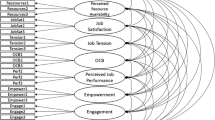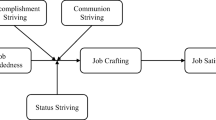Abstract
This study investigates the intervening effects of budgetary participation and job-relevant information on the relationship between budget emphasis and job satisfaction. It proposes that budgetary participation and job-relevant information are endogenous to budget emphasis. Using the path analytical technique and based on a sample of 152 senior managers, the study found that budget emphasis has an insignificant direct effect on job satisfaction, but a strong indirect effect through job-relevant information and budgetary participation. The results also indicate that job-relevant information has an intervening effect on the relationship between participation and job satisfaction.
Similar content being viewed by others
References
Baiman, S., “Agency Research in Managerial Accounting:ASurvey. ” Journal of Accounting Literature 1, 154–213 (Spring 1982).
Baiman, S. and J. S. Demski, “Economically Optimal Performance Evaluation and Control Systems. ” Journal of Accounting Research 18(Suppl.), 184–228 (1980).
Baron, R. M. and D. A. Kenny, “The Moderator-Mediator Variable Distinction in Social Psychological Research Conceptual, Strategic and Statistical Considerations. ” Social Psychiatry and Psychiatric Epidemiology 51(6), 1173–1182 (1986).
Bartol, K. M., “Turnover Among DP Personnel: A Causal Analysis. ” Communications of the ACM 26, 807–811 (1983).
Becker, S. and D. Green, “Budgeting and Employee Behavior. ” The Journal of Business 35, 392–402 (Jan. 1960).
Brownell, P., “The Role of Accounting Data in Performance Evaluation, Budgetary Participation and Organisational Effectiveness. ” Journal of Accounting Research 20(1), 12–27 (Spring 1982).
Brownell, P., “Budgetary Systems and Control of Functionally Differentiated Organisational Activities. ” Journal of Accounting Research 23(2), 502–512 (Autumn 1985).
Brownell, P., “The Role of Accounting Information, Environment and Management Control in Multi-National Organizations. ” Accounting and Finance 1–16 (May 1987).
Brownell, P. and A. S. Dunk, “Task Uncertainty and Its Interaction with Budgetary Participation and Budget Emphasis: Some Methodological Issues and Empirical Investigation. ” Accounting, Organizations and Society 16(8), 693–703 (1991).
Brownell, P. and M. K. Hirst, “Reliance on Accounting Information, Budgetary Participation, andTask Uncertainty: Test of a Three-Way Interaction. ” Journal of Accounting Research 24(2), 241–249 (Autumn 1986).
Brownell, P. and M. Mclnnes, “Budgetary Participation, Motivation, and Managerial Performance. ” The Accounting Review 61(4), 587–600 (Oct. 1986).
Campbell, D. J. and K. F. Ginrich, “The Interactive Effects of Task Complexity and Participation on Task Performance: A Field Experiment. ” Organisational Behaviour and Human Decision Processes 38, 162–180 (Oct. 1986).
Chenhall, R. H. and P. Brownell, “The Effect of Participative Budgeting on Job Satisfaction and Performance: Role Ambiguity as an Intervening Variable. ” Accounting, Organizations and Society 225–233 (1988).
Dunham, R. B., F. J. Smith and R. S. Blackburn, “Validation of the Index of Organizational Reactions with the J.D.I., the M.S.Q. and Faces Scale. ” Academy of Management Journal 20(3), 420–432 (Sept. 1977).
Earley, P. C. and R. Kanfer, “The Influence of Component Participation and Role Models on Goal Acceptance, Goal Satisfaction and Performance. ” Organisational Behaviour and Human Decision Processes 36(3), 378–390 (1985).
Erez, M. and R. Arad, “Paricipative Goal Setting: Social, Motivation and Cognitive Factors. ” Journal of Applied Psychology 71, 591–597 (1986).
Frucot, V. and W. T. Shearon, “Budgetary Participation, Locus of Control, and Mexican Managerial Performance and Job Satisfaction. ” The Accounting Review 66(1), 80–89 (Jan. 1991).
Govindarajan, V., “Appropriateness of Accounting Data in Performance Evaluation: An Empirical Examination of Environmental Uncertainty as an Intervening Variable. ” Accounting, Organizations and Society 9(2), 125–135 (1984).
Greenberg, J., “Looking Fair vs Being Fair: Managing Impression of Organizational Justice. ” In B. M. Staw and L. L. Cummings (Eds.), Research in Organizational Behavior. Newbury Park, CA: Sage, 1990, Vol. 12, pp. 111–157.
Harrison, G. L., “The Cross-Cultural Generalizability of the Relation Between Participation, Budget Emphasis and Job Related Attitudes. ” Accounting, Organizations and Society 17(1), 1–15 (Jan. 1992).
Hartmann, Frank G. H. and F. Moers, “Testing Contingency Hypotheses in Budgetary Research: An Evaluation of the Use of Moderated Regression Analysis. ” Accounting, Organizations and Society 24(4), 291–315 (May 1999).
Hartmann, G. H., “The Appropriateness of RAPM; Toward the Further Development of Theory. ” Accounting, Organizations and Society 25(4/5), 451–482 (May-July 2000).
Hayes, D. C., “The Contingency Theory of Managerial Accounting. ” The Accounting Review 52(1), 22–39 (Jan. 1977).
Hirst, M. K., “Reliance on Accounting Performance Measures, Task Uncertainty and Dysfunctional Behavior: Some Extensions. ” Journal of Accounting Research 21(2), 596–605 (Autumn 1983).
Hopwood, A. G., “An Empirical Study of the Role of Accounting Data in Performance Evaluation. ” Journal of Accounting Research 10(Suppl.), 156–182 (1972).
Jamal, M., “Relationship of Job Stress to Job Performance: A Study of Managers and Blue-Collar Workers. ” Human Relations 38(5), 409–424 (May 1985).
Joy, V. L. and L. A. Witt, “Delay of Gratification as a Moderator of Procedural Justice-Distributive Justice Relationship. ” Group and Organization Management 17(3), 297–308 (1992).
Kaplan, R. S. and D. P. Norton, “Using the Balanced Scorecard as a Strategic Management System. ” Harvard Business Review 74(1), 75–85 (Jan./Feb. 1996).
Kompass Singapore 2000, Kompass South East Asia.
Kren, L. and W. M. Liao, “The Role of Accounting Information in the Control of Organizations: A Review of the Evidence. ” Journal of Accounting Literature 7, 280–309 (1988).
Kren, L., “Budgetary Participation and Managerial Performance: The Impact of Information and Environmental Volatility. ” The Accounting Review 67(3), 511–526 (July 1992).
Lau, C. M. and C. Buckland, “Budget Emphasis, Participation, Task Difficulty and Performance: The Effect of Diversity Within Culture. ” Accounting and Business Research 31, 37–55 (2000).
Lau, C. M. and C. Buckland, “Budgeting—Role of Trust and Participation: A Research Note. ” Abacus 37(3), 369–388 (Oct. 2001).
Lau, C. M., L. C. Low and I. R. C. Eggleton, “The Impact of Reliance on Accounting Measures on Job Related Tension and Managerial Performance: Additional Evidence. ” Accounting, Organizations and Society 20(5), 359–381 (July 1995).
Lindquist, T. M., “Fairness as an Antecedent to Participative Budgeting: Examining the Effects of Distributive Justice, Procedural Justice and Referent Cognitions on Satisfaction and Performance. ” Journal of Management Accounting Research 7, 122–147 (1995).
Lindsay, R. M. and A. S. C. Ehrenberg, “The Design of Replicated Study. ” The American Statistician 47(3), 217–228 (Aug. 1993).
Locke, E. A. and G. P. Latham, A Theory of Goal Setting and Task Performance. New Jersey: Prentice Hall, 1990.
Lowe, E. A. and R. W. Shaw, “An Analysis of Managerial Biasing: Evidence from a Company's Budgeting Process. ” The Journal of Management Studies 5(3), 304–315 (October 1968).
Magner, N., R. B. Welker and T. L. Campbell, “Testing a Model of Cognitive Budgetary Participation Processes in a Lataent Variable Structural Equations Framework. ” Accounting and Business Research 27(1), 41–50 (Winter 1996).
Merchant, K. A., “Influences on Departmental Budgeting: An Empirical Examination of a Contingency Model. ” Accounting, Organizations and Society 9(3/4), 291–310 (1984).
Milani, K. W., “The Relationship of Participation in Budget-Setting to Industrial Supervisor Performance and Attitudes: A Field Study. ” The Accounting Review 50(2), 274–284 (April 1975).
Miller, K. I. and P. R. Monge, “Participation, Satisfaction and Productivity: A Meta-Analytic Review. ” Academy of Management Journal 29(4), 727–753 (Dec. 1986).
Nouri, H. and R. J. Parker, “The Relationship Between Participation and Job Performance: The Roles of Budget Adequacy and Organizational Commitment. ” Accounting, Organizations and Society 23(5/6), 467–483 (1998).
O'Reilly, C. A., “Individuals and Information Overload in Organizations: Is More Necessarily Better?” Academy of Management Journal 23(4), 684–696 (Dec. 1980).
Oppenheim, A. N., Questionnaire Design and Attitude Measurement. New York: Basic Books, 1966.
Otley, D. T., “Budget Use and Managerial Performance. ” Journal of Accounting Research 16(1), 122–149 (Spring 1978).
Otley, D. T. and A. Fakiolas, “Reliance on Accounting Performance Measures: Dead End or New Beginning. ” Accounting, Organizations and Society 25(4/5), 497–510 (May–July 2000).
Ross, A., “Trust as a Moderator of the Effect of Performance Evaluation Style on Job Related Tension: A Research Note. ” Accounting, Organizations and Society 629–635 (1994).
Simon, R., “Planning, Control and Uncertainty: A Process View. ” In W. J. Bruns and R. S. Kaplan (Eds.), Accounting and Management: Field Study Perspectives. Cambridge, MA: Harvard University Press, 1987.
Swieringa, R. I. and R. H. Moncur, Some Effects of Participative Budgeting on Managaerial Behaviour. New York: National Association of Accountants, 1975.
Tiessen, P. and J. H. Waterhouse, “Towards a Descriptive Theory of Management Accounting. ” Accounting, Organizations and Society 8(2/3), 251–267 (1983).
Weiss, D. J., R. V. Dawis, G.W. England and L. H. Lofquist, Manual for the Minnesota Satisfaction Questionnaire, Minnesota Studies in Vocational Rehabilitation. Minneapolis, MN, 1967, Vol. 22.
Author information
Authors and Affiliations
Corresponding author
Rights and permissions
About this article
Cite this article
Lau, C.M., Tan, S.L. The Effects of Participation and Job-Relevant Information on the Relationship Between Evaluative Style and Job Satisfaction. Review of Quantitative Finance and Accounting 21, 17–34 (2003). https://doi.org/10.1023/A:1024803621137
Issue Date:
DOI: https://doi.org/10.1023/A:1024803621137




